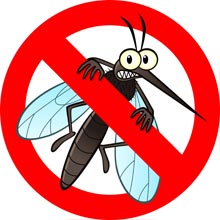Natural Mosquito Repellants

As news continues to emerge about the different mosquito viruses that are dangerous and prevalent, it’s easy to feel anxiety in the great outdoors. Olympic hopefuls are even canceling plans to attend the 2016 Olympics in Rio amidst the Zika virus scare, which can be spread by infected mosquitos.
Although the thought of being bitten by an infected mosquito is worrisome, the thought of using insect repellents that contain harmful pesticide ingredients may be also. Certain pesticides can cause irritation to the skin and have harmful side effects.

Due to the potential side effects from mosquito repellent, many have opted for natural repellents. You can easily make repellents to spray on yourself as well as your yard, and natural bug sprays can often last longer than store bought mosquito repellent.
One of the most common natural mosquito repellents is lemon eucalyptus oil. Lemon eucalyptus oil has been useful as a natural mosquito repellent since the 1940s, and has been approved by the Centers for Disease Control and Prevention as an effective mosquito repellent. However, researchers from the University of Florida have cautioned against using the oil on children under three.
A June 2006 Consumer Report article noted that after testing, lemon eucalyptus was the best non-DEET (diethyltoluamide) mosquito repellent. Studies have also shown that lemon eucalyptus oil used as a repellent can provide 120.1 minutes of protection against mosquitos as compared to a name-brand bug spray for kids containing a low-dose DEET, which keeps bugs at bay for approximately 88.4 minutes. A higher adult dose of DEET prevents mosquitos from biting for a longer period of time.
Another popular natural method that smells good and repels mosquitos is lavender. Lavender acts as an analgesic and antiseptic, meaning it has calming and soothing effects. You can add lavender to your flower beds outside or it can be grown in planters inside. When you crush the flowers of the lavender plant, it produces a fragrance and oil that will prevent mosquito bites when added to the skin.
Cinnamon oil used a cooking ingredient or to make your home smell good, can also act as a mosquito repellent. Not only is cinnamon oil useful to kill off mosquito eggs, but it can be used against adult mosquitoes, especially the Asian Tiger mosquito. Be careful, however, when applying to the skin, as it can be irritating. A diluted mix with water is best.
Thyme, another great cooking ingredient, can also be used for repelling mosquitoes when used in oil form. In studies performed, using thyme oil had an actual protection rate of 91 percent.
Catnip, a white and pink flower, can serve as a mosquito repellent when extract and oil are taken from the bruised leaves. Research shows that the oil from the plant can repel mosquitoes successfully for two to three hours. Further studies from Iowa State University revealed that catnip was found to be ten times more effective than DEET at repelling mosquitoes.
Citronella oil is derived from the leaves and stems of different species of Cymbopogon (lemongrass). This essential oil is one of the most common oils used in aromatherapy and can not only be used as a mosquito repellent, but can also be used to help treat and prevent colds, fevers and headaches. Citronella contains antiseptic properties and is used in soaps, household cleaners and detergents, and for treating insect bites.
Regardless of which mosquito repellent you decide to try, make sure that you dilute your choice with water or a lotion before applying to a small section on your skin and watch for any skin sensitivities or allergic reactions. If your skin does become irritated, clean the area and check with your physician or your local poison control center.
You might also be interested in...
-
 10 Cheap Activities For Family Fun Night
10 Cheap Activities For Family Fun Night
-
 8 Habits that Could Be Hurting Your Marriage
8 Habits that Could Be Hurting Your Marriage
-
 The Benefits Of Coconut Milk
The Benefits Of Coconut Milk
-
 Top Tips For Bone Health For Women
Top Tips For Bone Health For Women
-
 Caring for Both Your Children and Your Parents
Caring for Both Your Children and Your Parents
-
 Debunking Common Relationship Myths
Debunking Common Relationship Myths
-
 Family Life Insurance for Young Families
Family Life Insurance for Young Families
-
 Five Expensive Home Improvement Projects that Won’t Boost Value
Five Expensive Home Improvement Projects that Won’t Boost Value
-
 Five Home Improvement Projects that Pay Off
Five Home Improvement Projects that Pay Off
-
 Health Benefits Of Cashews
Health Benefits Of Cashews
-
 Help Your Aging Parents Prepare for Retirement
Help Your Aging Parents Prepare for Retirement
-
 How to Get the Grandkids to Help with Chores
How to Get the Grandkids to Help with Chores
-
 How to Prepare a Family History for the Younger Generations
How to Prepare a Family History for the Younger Generations
-
 Is Herbal Medicine The Way To Go
Is Herbal Medicine The Way To Go
-
 Natural Mosquito Repellants
Natural Mosquito Repellants
-
 Planning Ahead: Family Life Insurance
Planning Ahead: Family Life Insurance
-
 How To Prevent The Common Cold And Flu Virus
How To Prevent The Common Cold And Flu Virus
-
 Taking Care Of The Caregiver
Taking Care Of The Caregiver
-
 Ten Best Fruits, Vegetables, and Herbs Families Can Grow at Home
Ten Best Fruits, Vegetables, and Herbs Families Can Grow at Home
-
 Ten Tips for Successful Single Parent Families
Ten Tips for Successful Single Parent Families
-
 Top 10 Health And Safety Tips For Fall And Winter
Top 10 Health And Safety Tips For Fall And Winter
-
 Top Ten Household Safety Tips
Top Ten Household Safety Tips
-
 Why All Women Need Life Insurance Too
Why All Women Need Life Insurance Too
-
 Why you should go on vacation
Why you should go on vacation
-
 Who Should Be Your Beneficiary
Who Should Be Your Beneficiary
-
 The Benefits Of Vitamin B
The Benefits Of Vitamin B
-
 5 Reasons To Eat Homemade Chicken Noodle Soup
5 Reasons To Eat Homemade Chicken Noodle Soup
-
 6 Healthy Breakfast Ideas
6 Healthy Breakfast Ideas
-
 5 Tips To Prepare For Allergy Season
5 Tips To Prepare For Allergy Season
-
 Unusual Ways To Keep Your Mind Sharp
Unusual Ways To Keep Your Mind Sharp
-
 Food That Isn’t As Healthy As You Think
Food That Isn’t As Healthy As You Think
-
 4 Things That Are Secretly Killing Your Healthy Lifestyle
4 Things That Are Secretly Killing Your Healthy Lifestyle
-
 Questions You Need To Ask At Your Next Checkup
Questions You Need To Ask At Your Next Checkup
-
 How To Make A Comeback After An Illness
How To Make A Comeback After An Illness
-
 4 Benefits Of Water Most People Don’t Know
4 Benefits Of Water Most People Don’t Know
-
 Heartfelt Advice To Avoid Heart Disease
Heartfelt Advice To Avoid Heart Disease
-
 What Is Respite Care And Are You One Of Millions Of People That May Need It?
What Is Respite Care And Are You One Of Millions Of People That May Need It?
-
 Three Tricks To Healthy Eating
Three Tricks To Healthy Eating
-
 How Important Is Estate Planning?
How Important Is Estate Planning?
-
 5 Backyard Grill Safety Tips
5 Backyard Grill Safety Tips
-
 Combining Insurance After Marriage: Updating Your Life and Health Policies
Combining Insurance After Marriage: Updating Your Life and Health Policies
-
 Top 5 Crazy Food Options at Globe Life Park, Home of the Texas Rangers
Top 5 Crazy Food Options at Globe Life Park, Home of the Texas Rangers
-
 4 Dangers of Owning an Exotic Pet
4 Dangers of Owning an Exotic Pet
-
 4 Ways Life Insurance Helps Families Plan for the Future
4 Ways Life Insurance Helps Families Plan for the Future
-
 Why Young Families Need Life Insurance
Why Young Families Need Life Insurance
-
 Reasons to Consider Travel Insurance
Reasons to Consider Travel Insurance
-
 3 Ways to Know It's Time to Increase Your Life Insurance Coverage
3 Ways to Know It's Time to Increase Your Life Insurance Coverage

 Insurance products are available in New York from
Insurance products are available in New York from  Insurance products are available in your state from
Insurance products are available in your state from 




















































